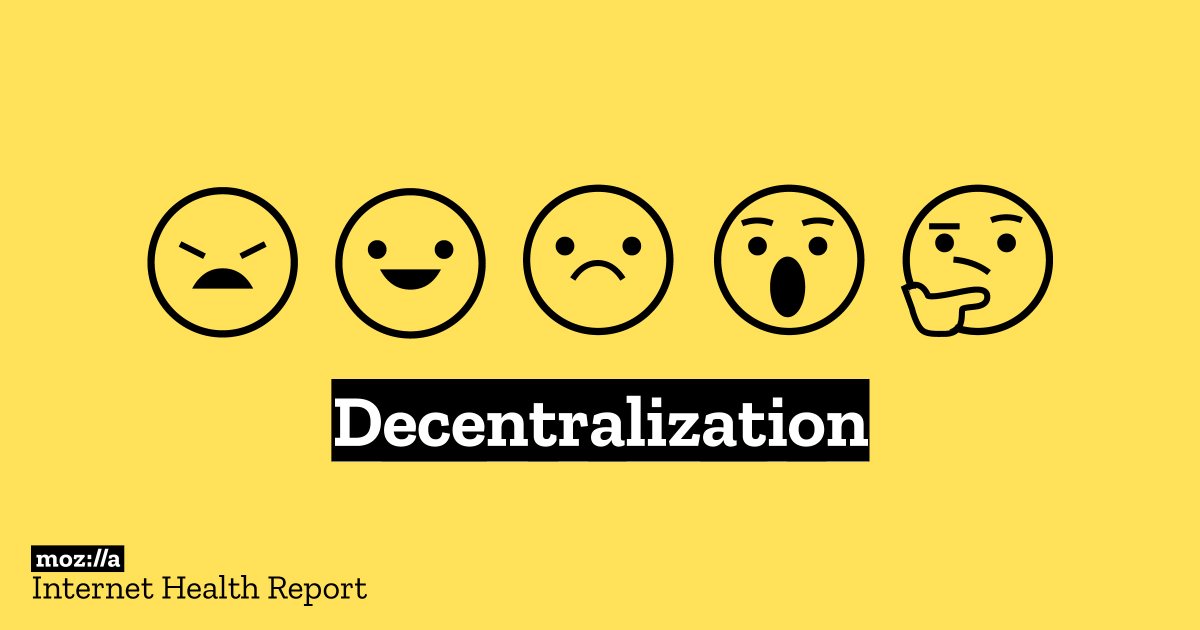Today we’re launching the 2018 #internethealth report. It's a detailed survey of what’s hurting 😞 and helping 😀 the internet, and how that impacts the *billions* of people who rely on it. You can read the report here: mzl.la/2uX4IHq 

To celebrate🎉 the launch of the report, throughout the week we’ll share some insights from the report, across our 5 #internethealth issues: Decentralization, Digital Inclusion, Openness, Privacy & Security & Web Literacy.
Today, we’re deep diving into 👇
Decentralization: who controls the internet? Did you know that Facebook owns WhatsApp & Instagram, & added *1.98 BILLION* users across all its platforms in a year? A huge amount of reach for one company 🧐: mzl.la/2qifzHk #internethealth
Decentralization: who controls the internet? Did you know that Facebook owns WhatsApp & Instagram, & added *1.98 BILLION* users across all its platforms in a year? A huge amount of reach for one company 🧐: mzl.la/2qifzHk #internethealth

And...Digital Inclusion. Digital Inclusion is all about who feels welcome online, and what — if any — digital divides persist. In the report, we dive into how in every region of the world *except* the Americas, men outnumber women online: mzl.la/2GQMoFq #internethealth 

Let's talk about Openness💡.
The internet is transformative when everyone can participate & innovate...but openness isn't guaranteed. Internet shutdowns *are* rising. 20 countries saw at least 104 shutdowns in '17, compared to 55 in '16: mzl.la/2qmzN1S #internethealth
The internet is transformative when everyone can participate & innovate...but openness isn't guaranteed. Internet shutdowns *are* rising. 20 countries saw at least 104 shutdowns in '17, compared to 55 in '16: mzl.la/2qmzN1S #internethealth

Wikipedia is one of the top five websites in the 🌏. Because its software relationships are publicly available, they can easily be mapped.
So, we used @librariesio to map @Wikipedia's open source software dependencies & contributors💫: mzl.la/2EDATeH #internethealth
So, we used @librariesio to map @Wikipedia's open source software dependencies & contributors💫: mzl.la/2EDATeH #internethealth
To be ourselves online, we *must* be able to trust the systems we use.
Over 3 billion compromised accounts were disclosed in 2017 — millions of people had their sensitive data stolen.
And yet...not all data collection is bad🤔. Opinion: mzl.la/2JFFb8X #internethealth
Over 3 billion compromised accounts were disclosed in 2017 — millions of people had their sensitive data stolen.
And yet...not all data collection is bad🤔. Opinion: mzl.la/2JFFb8X #internethealth

On the other hand, most internet users do not know enough about how their information is collected, shared, retained — and perhaps, reused.
We dug into what some of the biggest companies aren't telling us in their privacy policies: mzl.la/2vbkizu #internethealth
We dug into what some of the biggest companies aren't telling us in their privacy policies: mzl.la/2vbkizu #internethealth
• • •
Missing some Tweet in this thread? You can try to
force a refresh




